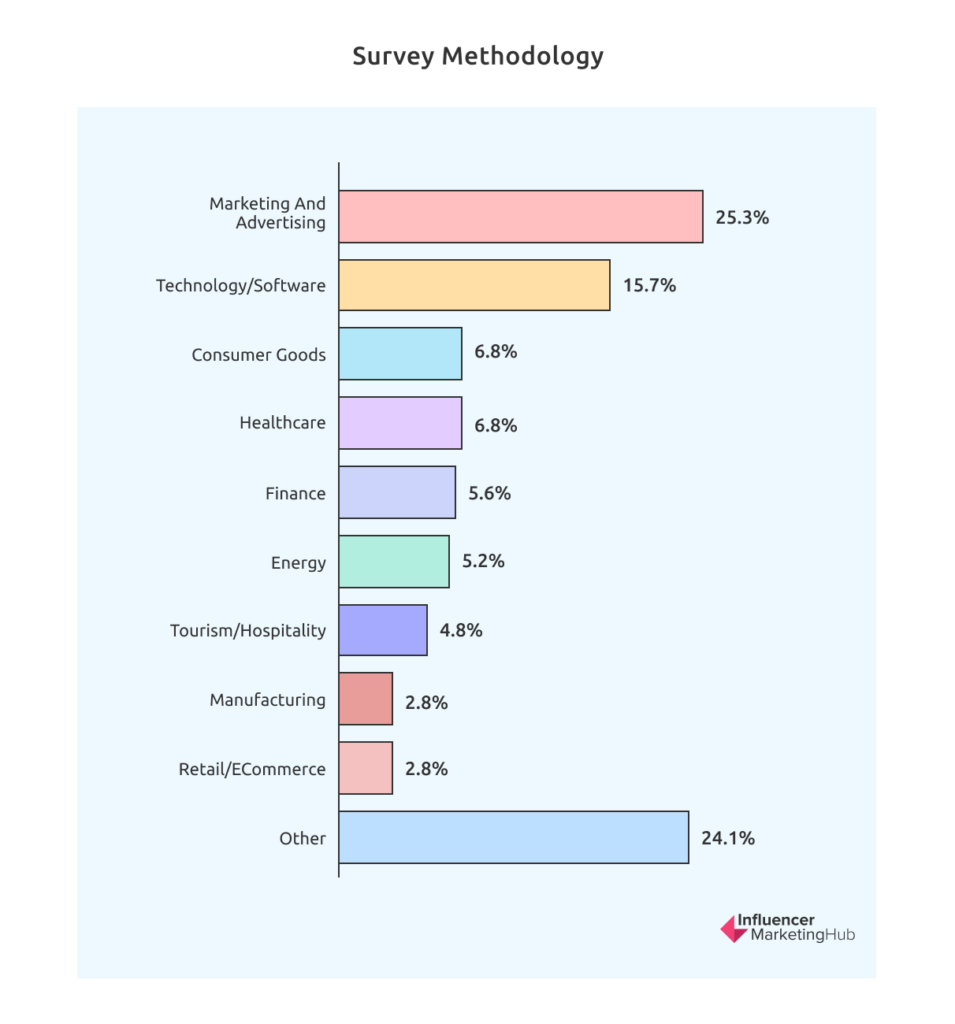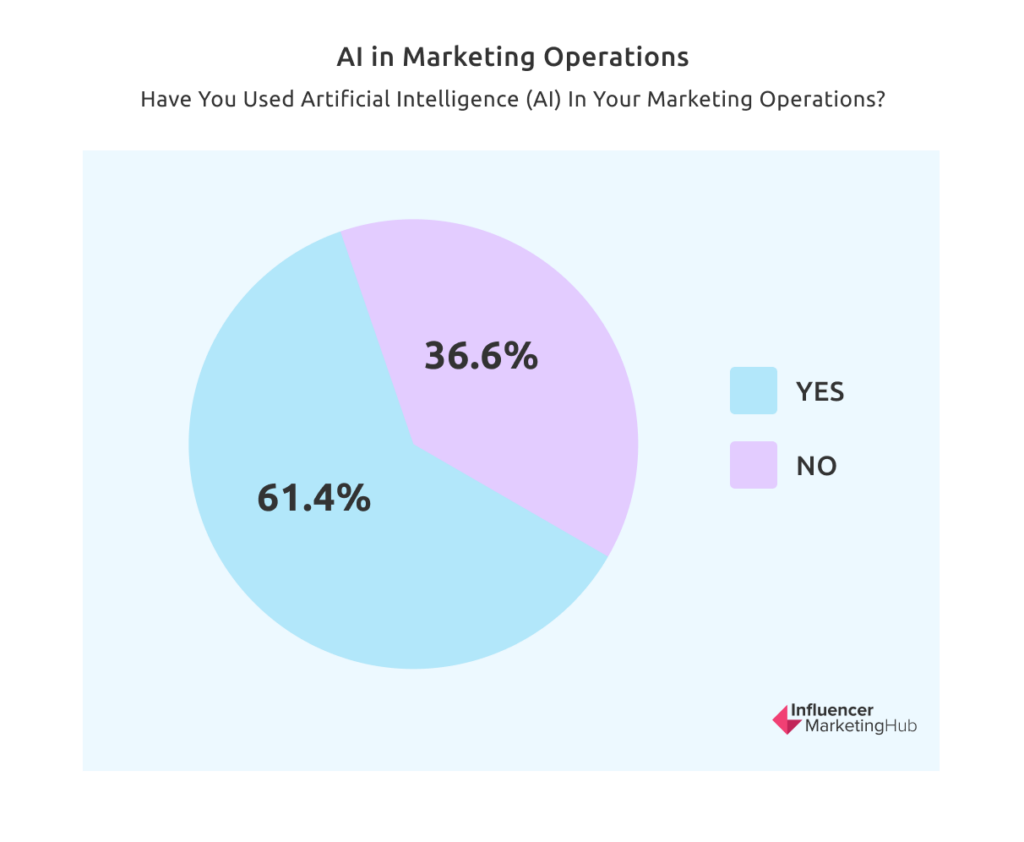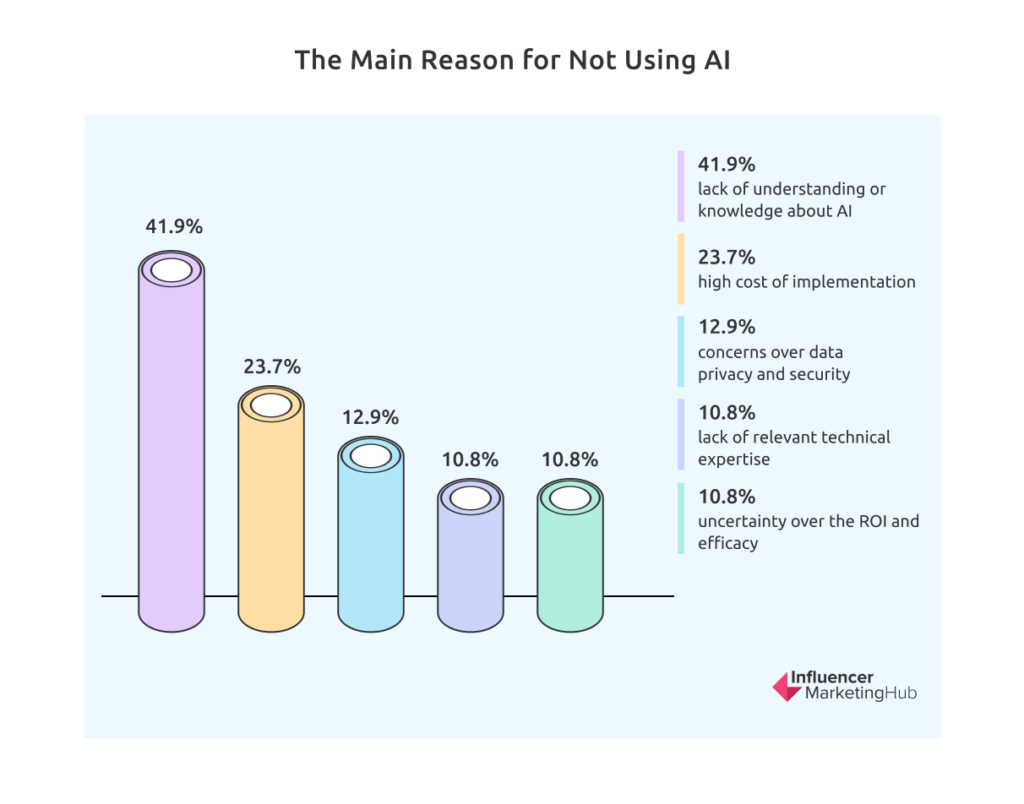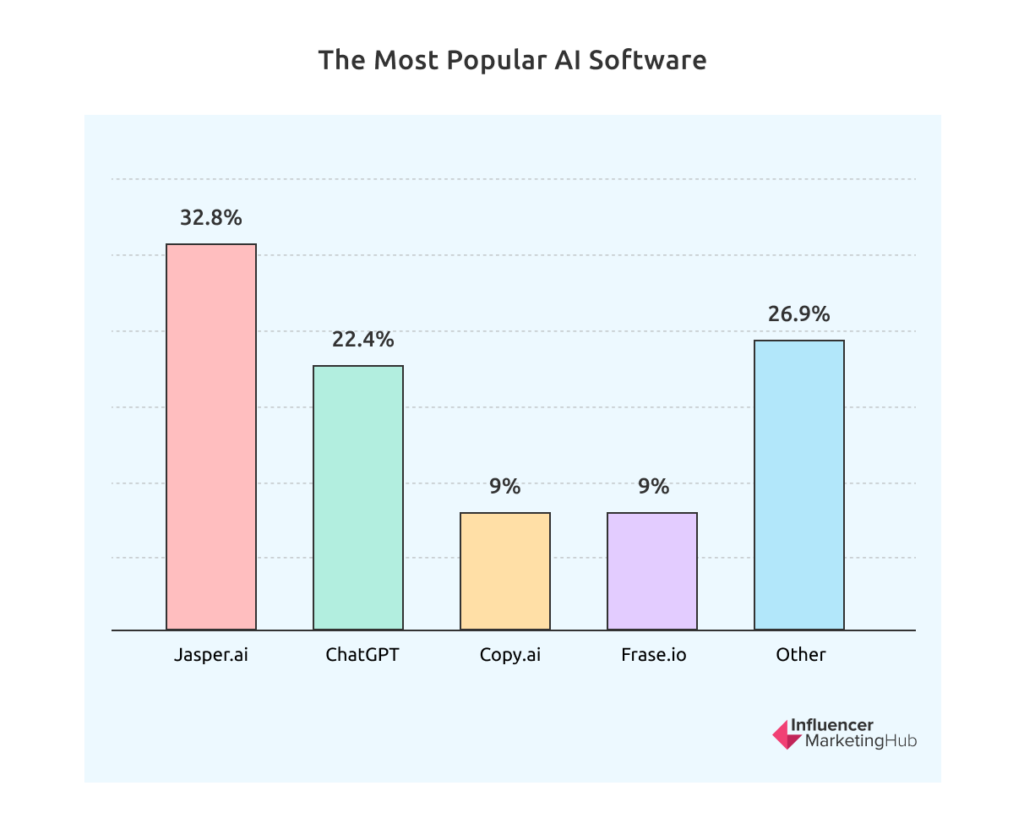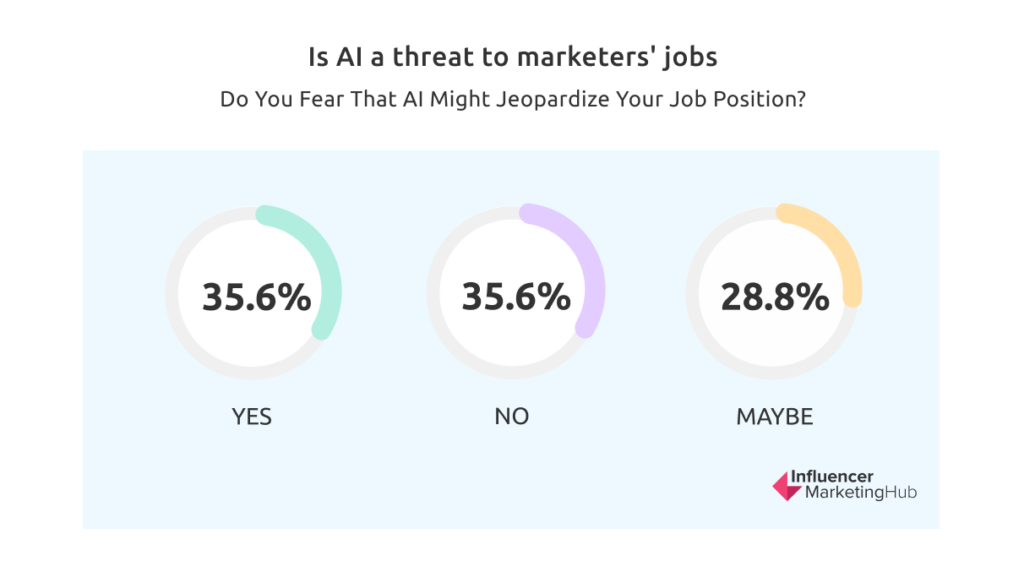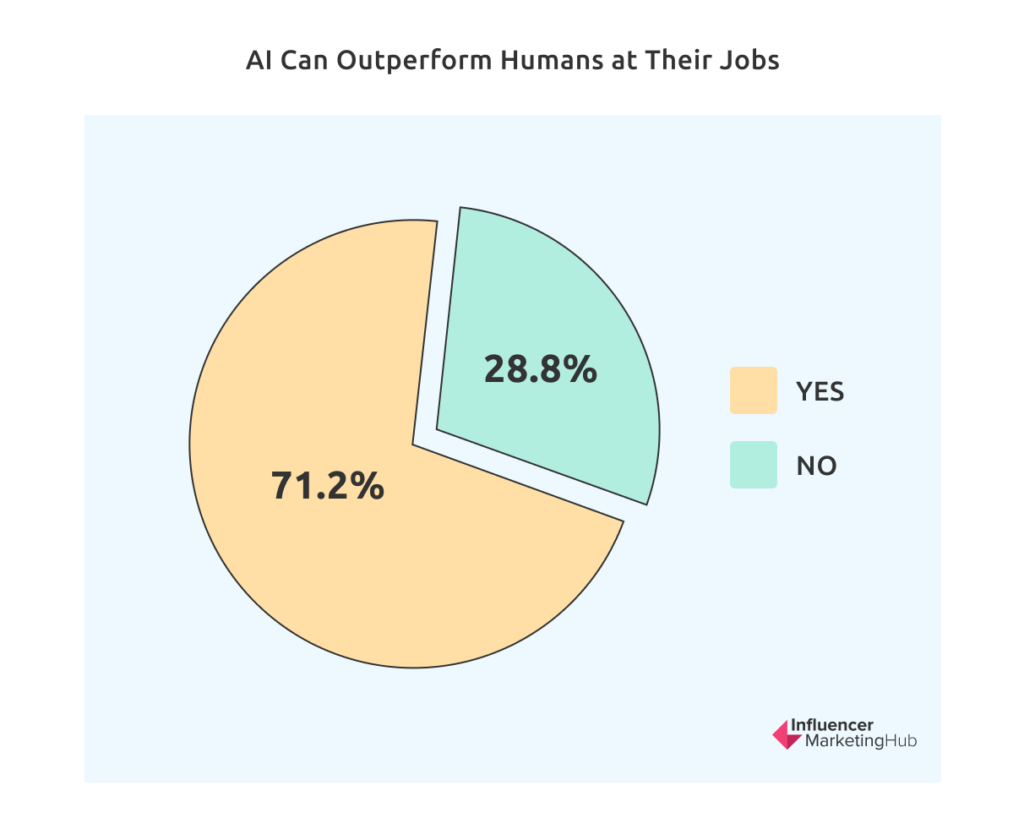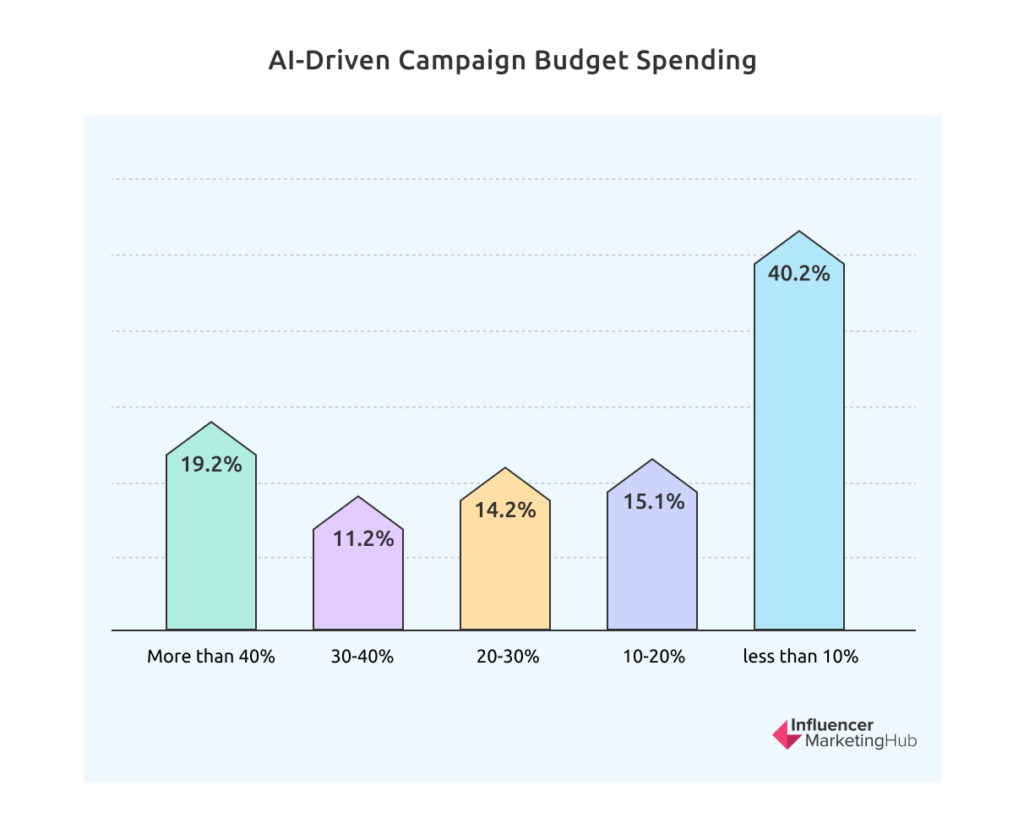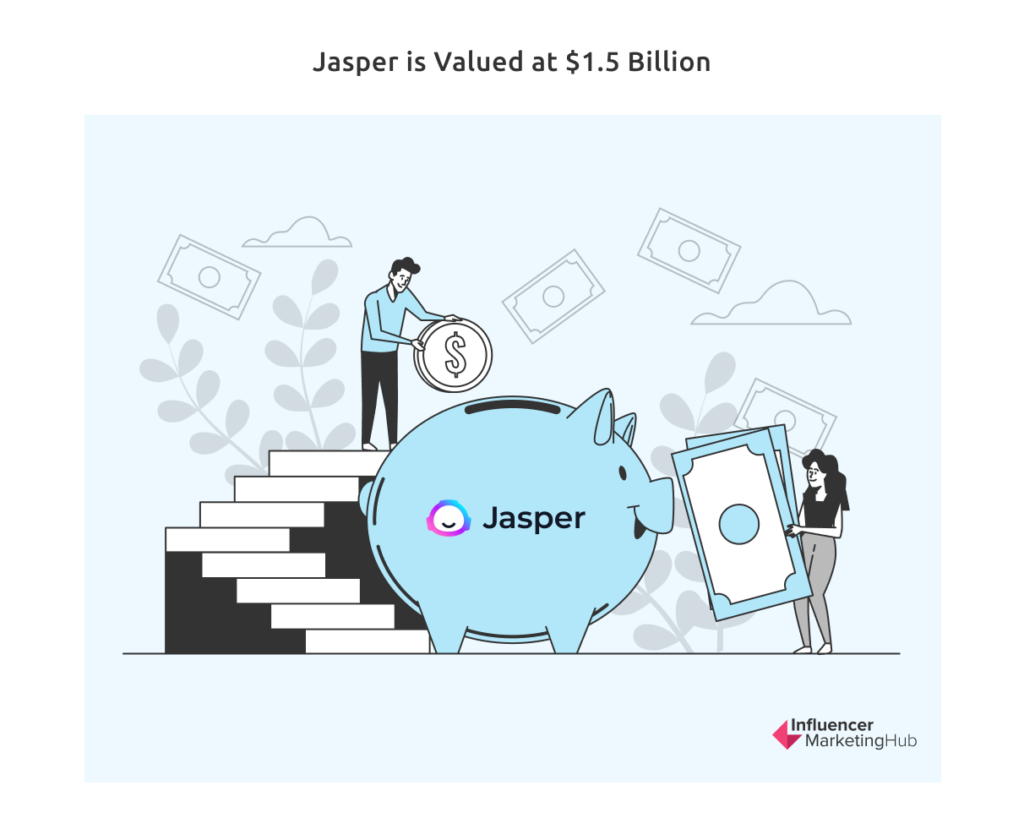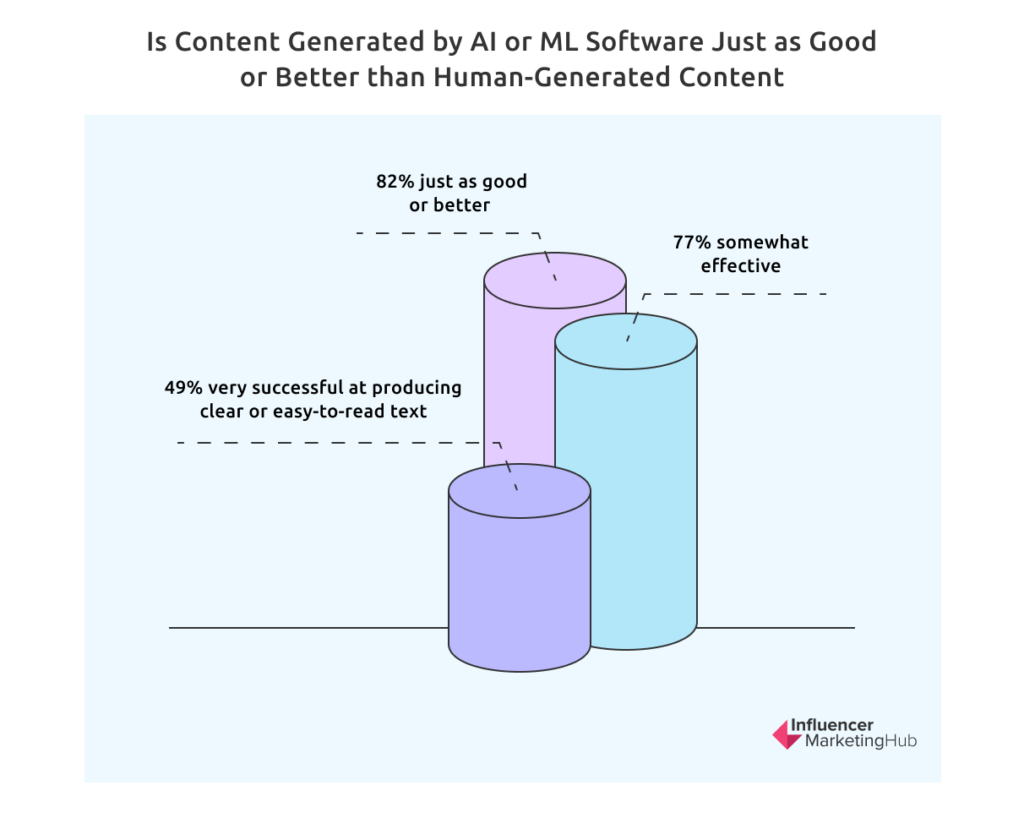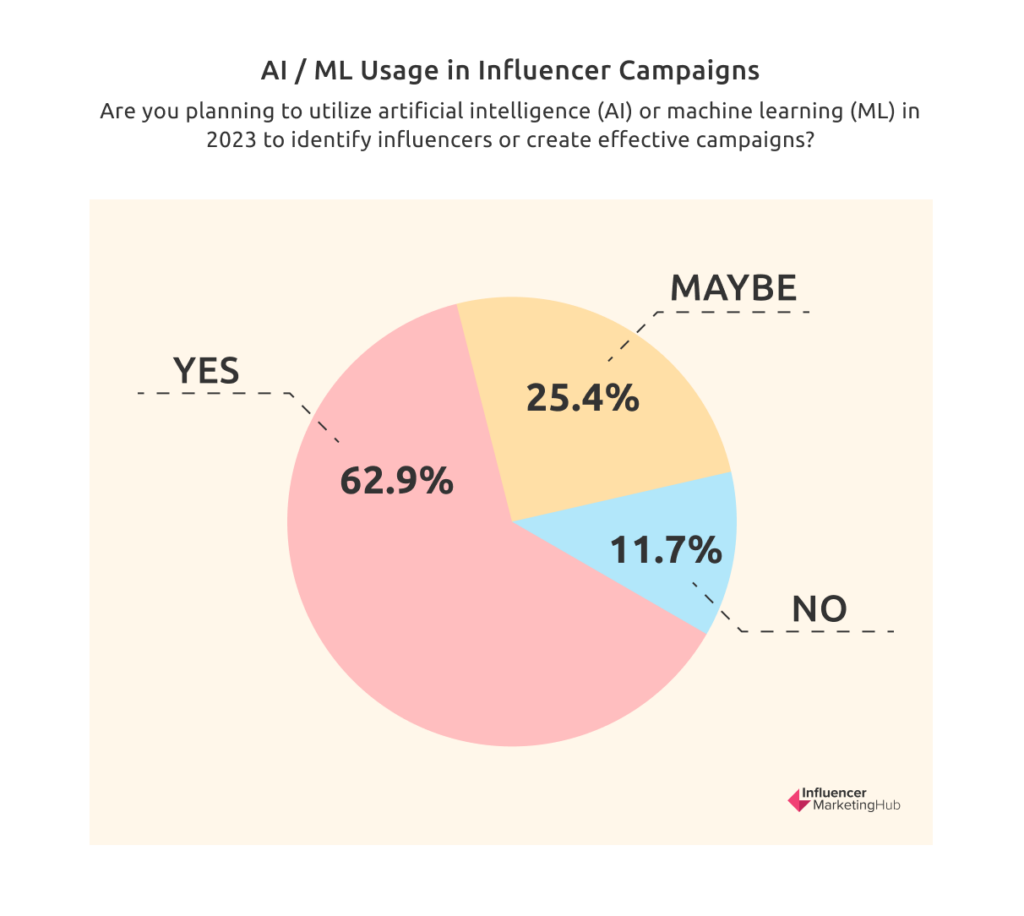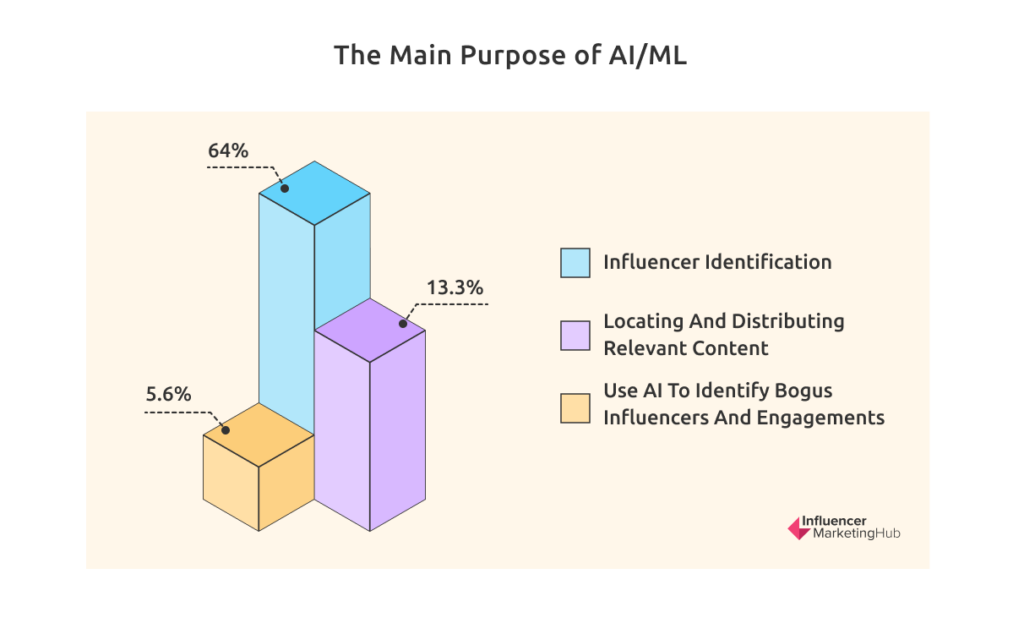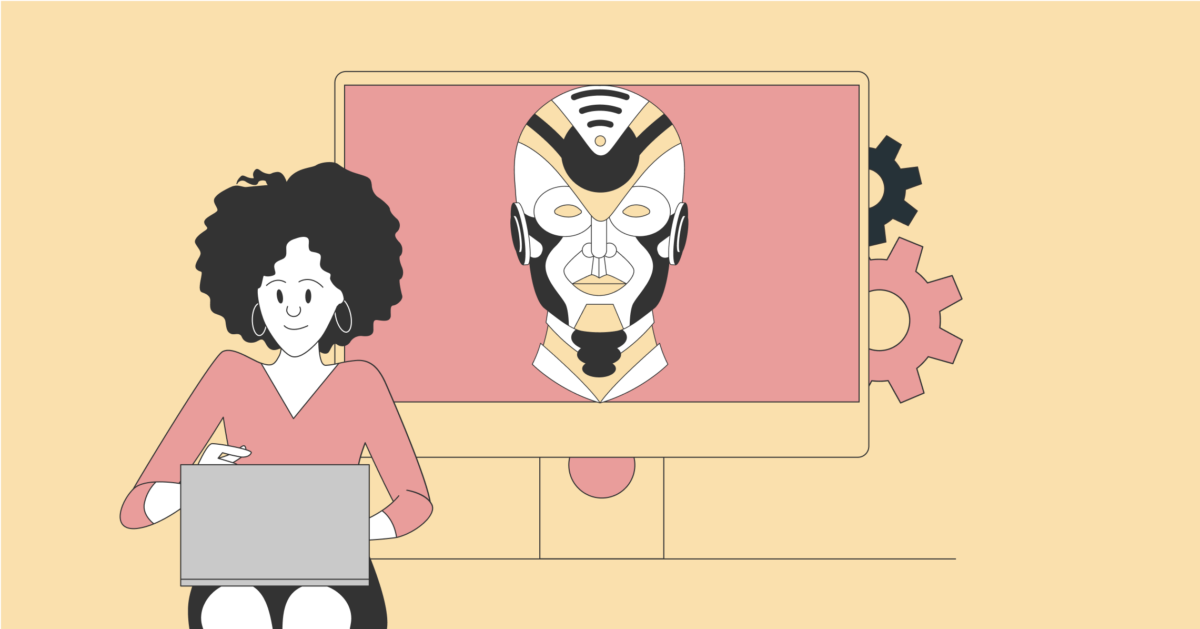The AI Marketing Benchmark Report 2023 is our inaugural overview of the use of AI by the marketing industry. It summarizes the thoughts of more than 2700 marketing agencies, brands, and other relevant professionals regarding the current state of AI marketing, along with some predictions of how people expect it to move over the next year and into the future. We have also collected relevant data from external sources to give a greater overview of the impact of AI on marketing currently.
As we wrote in the Ultimate Guide to AI Marketing in 2023, artificial intelligence allows marketers to gain on-point insights into the preferences and behavior of their customers. It can drive business growth and profitability as well as promote customer loyalty. Marketing using AI effectively automates data collection and behavioral targeting to help businesses achieve their goals.
We are currently at an exciting junction in the evolution of AI marketing. With the arrival of OpenAI’s ChatGPT last November, with its natural language processing capabilities along with an ability to analyze large amounts of data, AI is now going mainstream. We were amazed a couple of years ago by the speed at which TikTok reached 100 million monthly active users. Well, ChatGPT has now blown that out of the water, achieving the feat in just two months. Does that make it the TikTok of AI, and will its use become as ubiquitous?
AI Marketing Benchmark Report 2023:
- Notable Highlights
- Survey Methodology
- More Than 60% Have Used AI in Their Marketing Operations?
- The Main Reason for Not Using AI is a Lack of Understanding
- 44% Have Adopted AI for Marketing Content Production
- Nearly 1/3 of Our Respondents Have Used Jasper.ai
- Split Feelings About Whether AI Might Jeopardize Your Job Position
- More Than Half of Our Respondents Feel That AI Will Greatly Enhance Their Marketing Efforts
- 70%+ Believe That AI Can Outperform Humans at Their Jobs
- If AI Does Take Over Many Marketing Operations, Humans Will Still Carry Out High-Level Strategy and Decision Making
- 40% of Marketers Spent Less Than 10% of Their Budgets on AI-Driven Campaigns, But Nearly 20% Spent More Than 40%
- The AI Marketing Landscape
- Globally, AI Software Revenue is Expected to Reach $126B by 2025
- ChatGPT Races to One Million Users in Just Five Days
- ChatGPT is the Fastest Growing App in The History of Web Applications
- ChatGPT Capable of Passing Law School Exam
- By 2030, 70% of Companies are Likely to Adopt Some Form of AI Technology
- ChatGPT Caused Artificial Intelligence Token Prices to Surge by up to 77% in its First Week
- Traffic to OpenAI.com Has Skyrocketed Since the Release of ChatGPT
- 978 AI Tools Now Available
- AI Companies Have Raised Over $40 Billion Over the Last Year
- 450 Startups That Touch Generative AI Have Raised $12.4 Billion
- OpenAI Has Now Raised $11 Billion+ in Five Funding Rounds
- OpenAI Valued at Nearly $20 Billion in October 2022. By January 2023 This Had Risen to $29 Billion
- Jasper Raised $131 Million in Funding over Three Rounds
- Jasper is Valued at $1.5 Billion
- Generative AI Predicted to Account for 10% of All Data Created by 2025
- AI Engineering Will Generate Considerable Value from AI Efforts
- Organizations that Operationalize AI TRiSM Will See Their AI Models Achieve a 50% Result Improvement
- AI Thought Leader Predicts 90% of Online Content Will Be Generated by AI by 2025
- 82% of Marketers Say Content Generated by AI or ML Software is Just as Good (or Better!) than Human-Generated Content
- 63% of Marketers Use AI Tools for Email Marketing
- Notable Increase in Searches for AI and ChatGTP Over Recent Times
- AI Could Take the Jobs of as Many as One Billion People
- Artificial Intelligence Could Create 97 Million Jobs
- AI Could Affect Virtually Every Occupational Group – But Some More Than Others
- LinkedIn's Fastest-Growing Jobs Today Are in Data Science and Machine Learning
- Artificial Intelligence is Playing a Major Role in Improving Healthcare
- 63% Plan to Use AI or ML in Their Influencer Campaigns, and a Further 25% Might
- The Most Common Use for AI in Influencer Marketing is for Influencer Identification
- 75%+ Now Believe Influencer Marketing Can be Automated
Notable Highlights
- 61.4% of marketers have used AI in their marketing activities.
- 44.4% have used AI for content production.
- The AI tool most often used by marketers is Jasper.ai (32.8%).
- 54.5% take the optimistic view that AI will most likely greatly enhance their marketing efforts.
- 71.2% believe that AI can outperform humans at their jobs.
- 19.2% of our respondents spent more than 40% of their marketing budget on AI-driven campaigns.
- ChatGPT reached an estimated 100 million monthly active users in January 2023, just two months after launch, making it the fastest-growing consumer application in history.
- More Than 60% Plan to Use AI or ML in Their Influencer Campaigns
- 42.2% believe that if AI took over in terms of marketing operations, high-level strategy and decision-making tasks would be left for human marketers.
- The main reason for not using AI yet, (41.9%) was because of a lack of understanding and a high cost of implementation (23.7%).
Survey Methodology
We surveyed approximately 2700 people from a range of backgrounds. Just over a quarter (25.3%) work in Marketing and Advertising, followed by 15.7% working in Technology/Software. Other industry sectors with significant representation include Consumer Goods (6.8%), Healthcare (6.8%), Finance (5.6%), Energy (5.2%), Tourism/Hospitality (4.8), Manufacturing (2.8%), and Retail/eCommerce (2.8). A further 24.1% of respondents were from other sectors, classified here as Other.
By far the largest percentage of our respondents (47%) worked in marketing departments, with the next highest job types being in data (9.5%) and sales (8.7%). Approximately 5% of respondents came from each of the Accounting, Finance, and Engineering departments, with everybody else occupying a wide variety of job roles.
Many of our respondents worked in relatively small businesses, however, there was a notable number of respondents representing very large businesses/corporations. More than a third, 36.5%, came from firms with fewer than 10 employees. When you add in the 15.2% from firms of 10-50 employees, you can see that more than half of our respondents came from firms with fewer than 50 staff.
However, the second most common firm size, 19.7%, was corporations with more than 1000 employees. There was smaller representation from firms with 50-100 employees (14.3%) and 100-1000 (14.3%).
Results From Our Survey
More Than 60% Have Used AI in Their Marketing Operations?
We asked our respondents whether they had used artificial intelligence (AI) in their marketing to date. A surprisingly high 61.4% admitted that they have done so, leaving 36.6% yet to see what AI can do to assist their marketing activities.
The Main Reason for Not Using AI is a Lack of Understanding
We asked those of our respondents who hadn’t used AI in marketing why they hadn’t yet adopted the technology. By far the largest reason (41.9%) was because of a lack of understanding or knowledge about AI. We see this as a clear sign for us to publish more articles about the uses of AI in marketing, to better educate our readers about AI opportunities and increase your knowledge on the topic.
Other notable reasons suggested by those who have not yet adopted AI in marketing include a high cost of implementation (23.7%), concerns over data privacy and security (12.9%), a lack of relevant technical expertise (10.8%), and uncertainty over the ROI and efficacy (10.8%). Again, improved education on the uses of AI may alleviate some of these fears.
44% Have Adopted AI for Marketing Content Production
We asked those of our respondents who had used artificial intelligence in their marketing how they had done so. 44.4% said they had used it for content production. This is not surprising, as AI has proved its worth in this area, and as Convince&Convert claims, AI is revolutionizing content creation. Ways it is doing this include:
- AI takes personalization to a new level.
- AI provides Natural Language Generation (NLG), with AI tools being used to write everything from product descriptions to tweets, business data reports, and news articles.
- You can use AI to generate data-specific content for social media posts, brief reports, news updates, and other small content requirements.
- AI can provide valuable insights drawn from analyzing customer data and generating fresh keywords and topics.
- You can improve your social media content creation using AI, using AI-powered tools to go beyond demographics and analyze customer behaviors, sentiments, and preferences.
- AI tools can curate high-quality UGC which can be used in your social media campaigns.
Aside from content production, other popular uses for AI in marketing include Conversion Optimization (12.3%), Predictive Analytics (12.2%), and Chatbots/Customer Service (11.7%).
Nearly 1/3 of Our Respondents Have Used Jasper.ai
We asked those of our respondents who had used AI about the products they use most. The most popular product was Jasper.ai (32.8%). Jasper.ai offers an AI platform that makes it easy to create high-quality content, blogs, social media content, emails, and more. It includes advanced features like Custom Recipes, Content Generator, Templates, Jasper Chat, and more.
Other popular types of AI used by our respondents include ChatGPT (22.4%), Copy.ai (9%), and Frase.io (9%). In addition, 26.9% of our respondents use a variety of other programs and platforms that incorporate AI to assist them with their marketing.
It will be interesting to see whether ChatGPT manages to top this list in next year’s report.
Split Feelings About Whether AI Might Jeopardize Your Job Position
The marketers (and other respondents) in our survey have mixed feelings about the effects of AI on their jobs. 35.6% of our respondents are concerned that the increased use of AI might jeopardize their job position. An equal number had no such fears. That left 28.8% sitting on the fence, believing that the use of AI might (or might not) harm their job position.
We will probably have to wait and see how the marketing landscape moves over the next few years, and whether the changes brought on by AI usage affect employment levels and types, but as we see below, there has already been an impact on certain job types.
More Than Half of Our Respondents Feel That AI Will Greatly Enhance Their Marketing Efforts
We asked our respondents to look ahead and envision how they see the effects of AI on marketing in the future, and whether they have concerns their company would likely be impacted by other companies potentially utilizing AI more effectively than their own organization. 54.5% took the optimistic view that AI will most likely greatly enhance their marketing efforts. When you add in the neutral view, that AI will have a moderate impact on marketing (17.1%), and the uncertain view, where respondents are still evaluating the impact of AI on marketing (14.4%), that just leaves 14% currently feeling pessimistic that AI will replace traditional marketing jobs.
70%+ Believe That AI Can Outperform Humans at Their Jobs
Considering the general overall positive feeling towards AI by our respondents, it is perhaps unsurprising that most have a healthy respect for the capabilities of artificial intelligence. Indeed 71.2% stated that they believe that AI can outperform humans at their jobs, a notion rejected by just 28.8%.
If AI Does Take Over Many Marketing Operations, Humans Will Still Carry Out High-Level Strategy and Decision Making
Although most of our respondents don’t feel that AI will affect their job prospects, we asked them about the worst-case scenario. If AI took over in terms of marketing operations, what tasks do they envision would be left for human marketers to perform?
The most frequent response was high-level strategy and decision-making (42.2%) followed by creativity and emotional appeals (22.6%). Clearly, our marketers feel that humans will continue to have the edge in creativity for some time yet. Other notable marketing tasks likely to remain with humans include personalized customer interactions and relationship building (17.8%) and ethics and responsibility (17.4%). Humans are clearly still needed for higher thinking skills.
40% of Marketers Spent Less Than 10% of Their Budgets on AI-Driven Campaigns, But Nearly 20% Spent More Than 40%
We have seen in our other benchmark reports that most brands spread their marketing budget across a range of different marketing types. For example in our State of Influencer Marketing 2023: Benchmark Report we discovered that although more than 80% of our respondents intend to dedicate a budget to influencer marketing in 2023, only 23% intend to spend more than 40% of their marketing budget on influencer campaigns. We have noticed a similar pattern concerning AI-driven campaigns.
19.2% of our respondents spent more than 40% of their marketing budget on AI-driven campaigns, 11.2 % spent 30-40%, 14.2% spent 20-30%, 15.1% spent 10-20%, leaving 40.2% who allocated less than 10% of their marketing money to those involving AI. Clearly, many firms tried it out in 2022, and it will be interesting to see if they expand their efforts as time moves on.
The AI Marketing Landscape
As you can see from the above AI Marketing Market Map, there are now a considerable number of companies involved in artificial intelligence. And although the above map is comprehensive it isn’t complete. New companies release software incorporating AI tools virtually every week, and this map is likely to grow dramatically yet.
Businesses have found tools to assist with use cases for AI in multiple marketing aspects. We have categorized them into:
- Personalization
- Content Marketing
- Predictive Analytics
- Sales and Chatbot
- SEO
- Digital Ads
- Social Media Marketing
- Customer Service
- Email Marketing
- Data and Customer Segmentation
- Image and Video Editing
- Market Intelligence
You can find reviews of many of these tools on the Influencer Marketing Hub, with more being added regularly.
We include a selection of relevant statistics from reliable third-party sources.
Globally, AI Software Revenue is Expected to Reach $126B by 2025
The global artificial intelligence (AI) software market is forecast to grow rapidly in the foreseeable future. Statista reports that artificial intelligence software market revenue worldwide is expected to reach $126 billion by 2025. This includes applications in natural language processing, robotic process automation, and machine learning.
ChatGPT Races to One Million Users in Just Five Days
OpenAI released a revolutionary new chatbot in November 2022, ChatGPT. While, by definition, it is still learning, its plain language capabilities are beyond anything publicly available previously. It can answer questions and take instructions in a conversational, human-like way, and even answer follow-up questions, admit its mistakes, challenge incorrect premises, and reject inappropriate requests.
While the capabilities of ChatGPT would clearly be of interest to many people, including marketers, the level of involvement has been truly astounding. One million people used ChatGPT in its first five days.
Perhaps it’s best to see the level of this achievement by comparing this with how long it took other apps and platforms to reach the 1 million user milestone. Instagram, for instance, took 2.5 months to achieve 1 million downloads and Spotify took five months. Facebook took ten months to gain 1 million users, and Twitter took more than twice as long as that (two years). And while we all seem to have a Netflix account nowadays, it took them 3.5 years to gain their first 1 million users. So, in comparison, ChatGPT’s five days to reach 1 million users is a significant milestone.
ChatGPT is the Fastest Growing App in The History of Web Applications
According to research from UBS Research, ChatGPT reached an estimated 100 million monthly active users in January 2023, just two months after its launch. This made it the fastest-growing consumer application in history.
In comparison, it took TikTok about nine months after its global launch to reach 100 million users and Instagram 2-1/2 years.
ChatGPT Capable of Passing Law School Exam
Jonathan Choi, a professor at Minnesota University Law School, gave ChatGPT the same test faced by his students. It consisted of 95 multiple-choice questions and 12 essay questions. The bot scored a C+ grade overall.
It must be noted, however, that the bot was near the bottom of the class in most subjects and "bombed" at multiple-choice questions involving mathematics. However, it displayed a strong grasp of basic legal rules and had consistently solid organization and composition in the essays. It did struggle to spot issues when given an open-ended prompt.
By 2030, 70% of Companies are Likely to Adopt Some Form of AI Technology
The McKinsey Global Institute has attempted to simulate the impact of AI on the world economy. Their simulations indicated that by 2030, 70% of companies might have adopted at least one type of AI technology but that less than half will have fully absorbed all five categories McKinsey analyzed (computer vision, natural language, virtual assistants, robotic process automation, and advanced machine learning). They found AI has the potential to deliver additional global economic activity of around $13 trillion by 2030, about 16% higher cumulative GDP compared with today.
ChatGPT Caused Artificial Intelligence Token Prices to Surge by up to 77% in its First Week
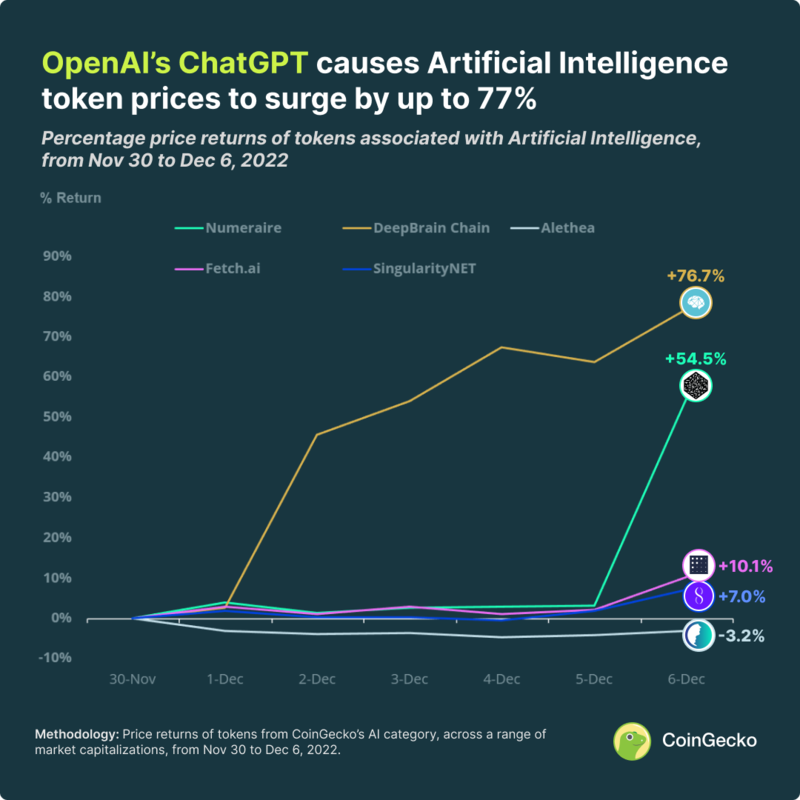
Source: coingecko.com
CoinGecko showed significant increases in the returns on various AI token prices in the first week of ChatGPT’s release. After a sudden burst at the beginning of the week, DeepBrain Chain (DBC) continued to rise to reach a 76.7% increase in returns in a single week. A late burst from Numeraire saw an almost as notable 54.5% increase in returns.
However, that was only the start of DeepBrain’s rise. Although fluctuating somewhat, by February 8, 2023, DeepBrain’s token price was 1,751% higher than it had been on November 30, 2022. Numeraire’s price has also risen during that time, although by nowhere as much as DeepBrain.
CoinGecko describes DeepBrain Chain (DBC) as outperforming similar Artificial Intelligence (AI) cryptocurrencies recently.
Traffic to OpenAI.com Has Skyrocketed Since the Release of ChatGPT
Before the release of ChatGPT, OpenAI was receiving 500,000 to 1 million visitors per day (Similarweb). Daily usage skyrocketed to 2.5 million visits on December 3, 2022, and continued to grow over the next few days. They reached 6.5 million visitors on December 6.
By February 2023, ChatGPT had become the fastest-growing app ever to hit 100 million users. It averaged 13 million daily unique visitors in January, peaking on January 31 when the site attracted 28 million visits from 15.7 million unique visitors.
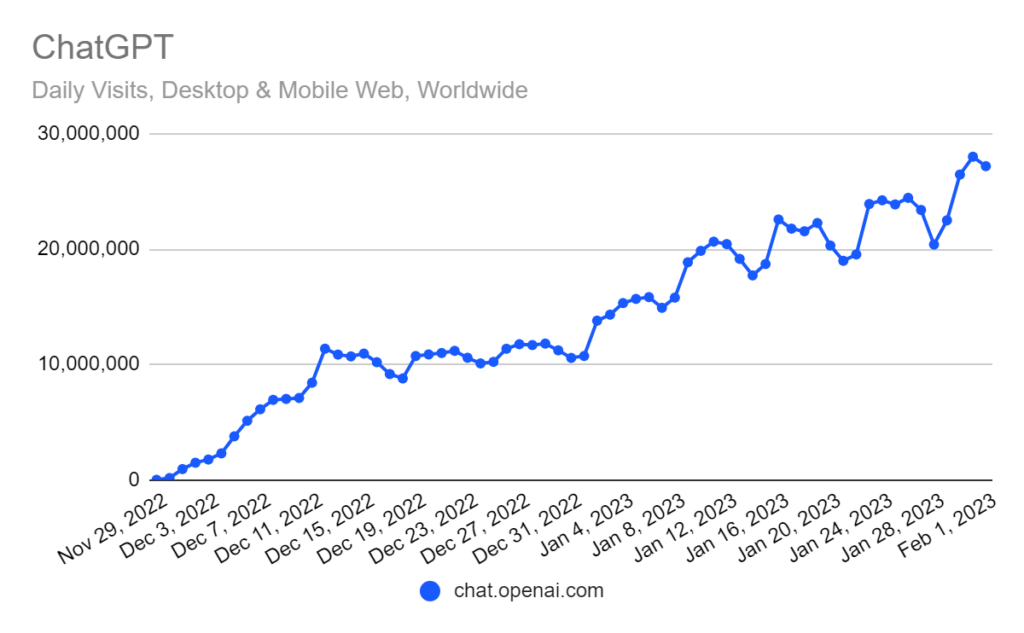
Source: similarweb.com
978 AI Tools Now Available
Futurepedia has grouped available AI tools by category. As of February 2023, it recognizes 978 AI tools covering 50 categories. Some of the most active categories for AI tools are Productivity (75 tools), Life Assistant (70 tools), Fun tools (64 tools), Developer Tools (60 tools), Low-code/No Code (58 tools), Search Engine (52 tools), Copywriting (50 tools), Social Media Assistant (45 tools), General Writing (43 tools), and Sales (42 tools).
AI Companies Have Raised Over $40 Billion Over the Last Year
According to Crunchbase, AI companies have received a total of $41.2 billion in funding over the last 12 months. Unsurprisingly, the greatest sum ($10 billion) went to OpenAI, the creators of ChatGPT. This was followed by Cruise (who builds self-drive vehicles), who raised $1.35 billion.
Overall, 2,680 organizations received funding for artificial intelligence purposes over the last year.
450 Startups That Touch Generative AI Have Raised $12.4 Billion
According to NFX’s Generative AI Tech Open-Source Market Map, 450+ startups raised $12.4 billion. This refers to all industries and all types of AI tools.
NFX suggests there is a 5-layer generative tech stack, with tools fitting into the following layers:
5. Applications layer
4. OS or API layer
3. Hyperlocal AI models
2. Specific AI models
1. General AI models
NFX has included any start-ups whose products fit into the 5-layer generative tech stack in their $12.4 billion calculation. As with the CrunchBase data above, OpenAI tops NFX’s list.
OpenAI Has Now Raised $11 Billion+ in Five Funding Rounds
As we referred to above, the sole investor in OpenAI was Microsoft, which clearly sees the potential of ChatGPT. However, OpenAI had also received funding from Microsoft in the past. It received $1 billion from the corporation in July 2019.
In addition, OpenAI received $120K from Y Combinator in a Pre-Seed Round in 2016, an undisclosed sum of seed funding from Reid Hoffman Foundation and Khosla Ventures in 2019, and an additional undisclosed sum on the Secondary Market from four investors (Tiger Global Management, Sequoia Capital, Bedrock Capital, and Andreessen Horowitz) in January 2021.
OpenAI Valued at Nearly $20 Billion in October 2022. By January 2023 This Had Risen to $29 Billion
In October 2022, The Information reported that in a sale of OpenAI stock by existing shareholders to investors including Sequoia Capital, Tiger Global Management, Bedrock Capital, and Andreessen Horowitz, the share price implied a valuation of nearly $20 billion.
By January 2023, however, OpenAI was in talks to sell existing shares in a tender offer that would value the company at around $29 billion.
Jasper Raised $131 Million in Funding over Three Rounds
The most popular product in our survey was Jasper.ai. To date, Jasper has received $131 million in funding from 11 investors (two lead investors) in three funding rounds. It received an undisclosed sum in a Venture Round in April 2021, $6 million in a Seed Round in June 2021, and $125 million in Series A, in October 2021.
Jasper is Valued at $1.5 Billion
The raising of $125 million in Series A funding in 2021 gave Jasper a $1.5 billion valuation. Jasper has been recognized as "one of America's fastest-growing private companies" by Inc. 5000.
Generative AI Predicted to Account for 10% of All Data Created by 2025
Gartner predicts that by 2025, generative AI will account for 10% of all data created, compared with 1% in 2022. They acknowledge that generative AI can be used both for good (creating software code, facilitating drug development, and targeted marketing), but it can also be misused (for scams, fraud, political disinformation, forged identities, and more.)
AI Engineering Will Generate Considerable Value from AI Efforts
Gartner also included a section on AI Engineering in its technology trends of 2022. AI Engineering combines the principles of systems engineering, software engineering, computer science, and human-centered design to create AI systems in accordance with human needs for mission outcomes.
Gartner believes that by 2025, 10% of enterprises will establish AI engineering best practices, and these firms will generate at least three times more value from their AI efforts than the 90% of enterprises that do not.
Organizations that Operationalize AI TRiSM Will See Their AI Models Achieve a 50% Result Improvement
Gartner has now released their Top 10 Strategic Technology Trends 2023. One of their predicted trends is that by 2026, organizations that operationalize AI transparency, trust, and security models (AI TRiSM) will see their AI models achieve a 50% result improvement in terms of adoption, business goals, and user acceptance.
AI Thought Leader Predicts 90% of Online Content Will Be Generated by AI by 2025
AI thought leader, Nina Schick, told Yahoo Finance Live that she believed that ChatGPT would completely revamp how digital content is developed. She believes we might reach 90% of online content generated by AI by 2025. "ChatGPT has really captured the public imagination in an extremely compelling way, but I think in a few months' time, ChatGPT is just going to be seen as another tool powered by this new form of AI, known as generative AI," she said.
82% of Marketers Say Content Generated by AI or ML Software is Just as Good (or Better!) than Human-Generated Content
In 2022 Capterra surveyed 185 marketers who clearly believe that AI is performing well at writing and speaking like a human. Capterra found that 82% of marketers agree that content generated by AI or ML software is just as good or better than human-generated content. In addition, 77% of marketers said AI or ML software is overall very or somewhat effective when it comes to accomplishing marketing objectives. 49% also believe that AI is very successful at producing clear or easy-to-read text.
63% of Marketers Use AI Tools for Email Marketing
Capterra’s survey also found that marketers strongly valued AI assistance in email marketing, with 63% of their respondents using AI for this purpose. We have previously written about the Top 12 AI Email Marketing Platforms to Grow Your Business, where we observe that the email marketing industry has taken to AI with gusto, and nearly every tool and platform contains some AI email marketing software element.
Other areas of marketing popular with Capterra’s respondents include Advertising (58% use AI tools to assist them), Data Analysis (57%), and Personalization (49%).
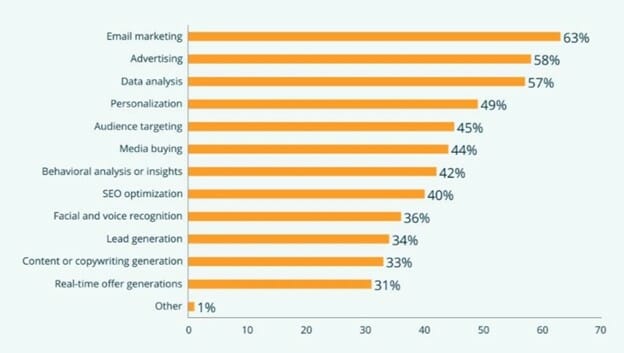
Source: capterra.com
Notable Increase in Searches for AI and ChatGTP Over Recent Times
You can use Google Trends to see the search interest for a term relative to its highest point over time – a score of 100 indicates the time when it receives its most searches.
As you would expect, ChatGTP is peaking in searches now. As we have seen above, interest in it is growing rapidly. The reason for the dip in interest shown near the end of the graph is that it corresponds to the Christmas/New Year period.
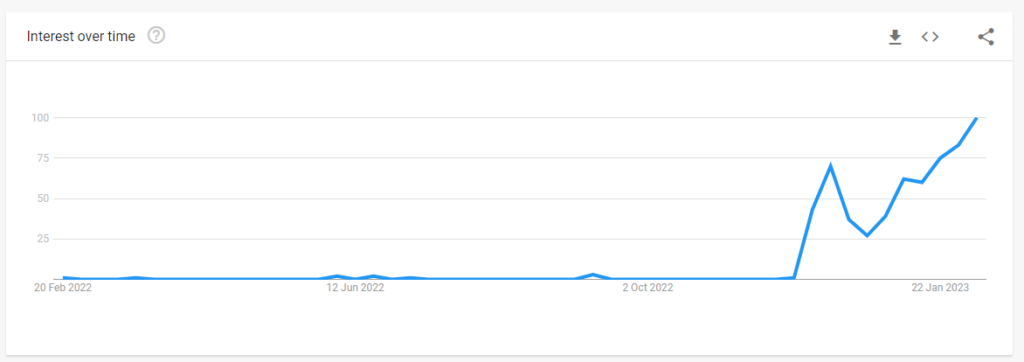
Source: trends.google.com
In the case of AI, we have looked at search results over the entire period covered by Google Trends (since January 2004). As can be seen, interest in AI now is the highest it has ever been. The previous peak was in January 2012.
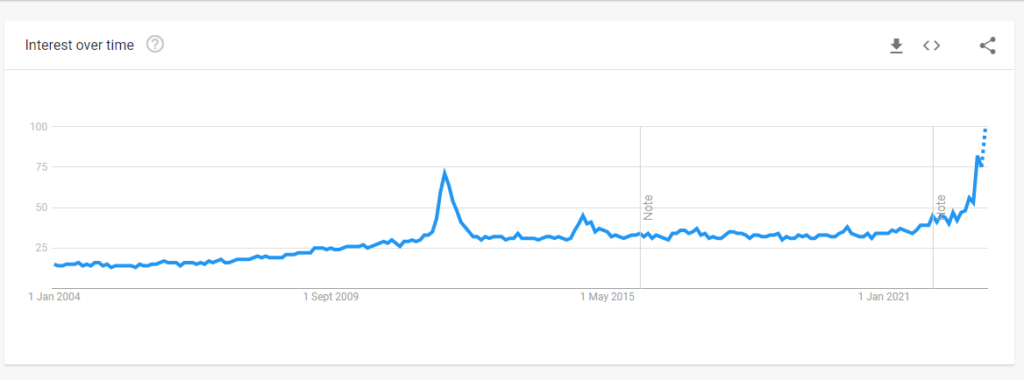
Source: trends.google.com
Google searches for the term “AI Marketing”, however, peaked in July 2021, with many people at that point beginning to see the potential for how marketing can help transform marketing.
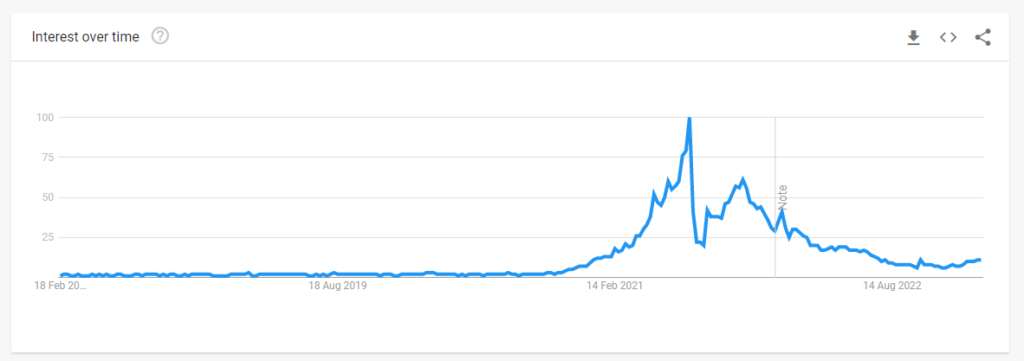
Source: trends.google.com
Ahrefs differs slightly regarding the timing of peak interest in AI marketing, with more than 20,000 queries for that keyword term in late 2021.

Source: ahrefs.com
AI Could Take the Jobs of as Many as One Billion People
While we have reported many positive statistics relating to the implementation of artificial intelligence solutions, we can’t shy away from the fact that there are some negative concerns. Zippia reports that AI could take the jobs of as many as one billion people globally and make 375 million jobs obsolete over the next decade. Newer, better-paying jobs likely won’t replace those lost, so without widespread retraining and reskilling, ordinary people will have significant difficulty finding new work. Zippia predicts that more than 120 million workers around the globe will need retraining and up-skilling in the next three years.
They see that by 2030, 45 million Americans could lose their jobs to AI automation, representing about one-quarter of the workforce. Zippia suggests that the transition could be as challenging as the USA shifting out of agriculture and manufacturing.
Artificial Intelligence Could Create 97 Million Jobs
Although AI is likely to replace far more jobs than it creates, a World Economic Forum report sees it creating 97 million jobs and generating $15.7 trillion for the economy by 2030 while eliminating mundane tasks and helping workers enjoy more creativity.
AI Could Affect Virtually Every Occupational Group – But Some More Than Others
With AI having such numerous applications it should be no surprise that its effects will have a widespread effect on employment. However, Zippia sees it as having the most effect on tasks requiring planning, learning, reasoning, problem-solving, and prediction.
The jobs most likely to face widespread disruption by the introduction of AI are:
- Customer service executives
- Bookkeeping and data entry
- Market research analysts
- Receptionists
- Proofreading
- Manufacturing and pharmaceutical work
- Retail services
- Courier services
- Taxi and bus drivers
- Doctors
- Soldiers
- Security guards
LinkedIn published a list of 10 emerging and declining jobs in 2022. While AI is not the only reason for this change in the job market, it is having a strong impact. The ten jobs that LinkedIn sees as declining in importance as technology takes over are:
- Data entry keyers
- Financial analysts
- Training specialists
- Word processors/typists
- Accountants
- Relationship managers
- Travel agents
- Telecom installers
- Bank tellers
- Administrative secretaries
LinkedIn observes that 40% of human jobs will be replaced by robots and machines in the next 15-20 years.
LinkedIn's Fastest-Growing Jobs Today Are in Data Science and Machine Learning
Of course, as Zippia forecasted, AI won’t replace all jobs. LinkedIn sees growth in the following job types:
- Data scientists
- Information security analysts
- Software architects
- AI/ML specialists
- Full-stack developers
- App developers
- Big data specialists
- Project managers
- Digital marketing specialists
While digital marketers can clearly see the potential of AI they will be pleased that they are unlikely to make themselves redundant.
Artificial Intelligence is Playing a Major Role in Improving Healthcare
Great Learning placed Healthcare at the top of its list of top industries and application areas of artificial intelligence in 2023. It sees AI as improving diagnostics, minimally invasive surgical procedures, drug development, better patient monitoring, and getting actionable insights into patients’ real-time needs. Artificial Intelligence is revolutionizing the healthcare industry by supporting and at times automating complicated medical processes and procedures efficiently.
Other industries leading the way in AI usage include:
- Agriculture
- Finance
- Space and aeronautics
- Exploring renewable energy
- Hiring platforms and systems
- Defense
We include a selection of relevant statistics from our State of Influencer Marketing Benchmark Report 2023.
63% Plan to Use AI or ML in Their Influencer Campaigns, and a Further 25% Might
We asked a new question in this year’s Influencer Marketing Benchmark Report about whether the respondents intended to use artificial intelligence (AI) in 2023 as part of their influencer campaigns. 62.9% said they would use AI tools, and a further 25.4% thought they may. This left a surprisingly small 11.7% who have no intention of using AI or ML in their influencer marketing this year. It is notable that AI is now so prevalent that nearly 90% of our respondents are seriously considering using tools that incorporate it.
The Most Common Use for AI in Influencer Marketing is for Influencer Identification
We asked those considering using AI/ML in their influencer marketing how they intended to use it. By far the most common reason suggested (64%) was using social media analytics to identify the most effective influencers for a campaign. This is probably not surprising, as multiple influencer marketing platforms have now added this capability to their offerings.
The second most common way our respondents considered using AI in influencer marketing is for locating and distributing relevant content (13.3%).
The third most popular use of AI in influencer marketing is to identify bogus influencers and engagements. Only 5.6% of the respondents considered this purpose, however, but this is likely to become more popular with more products adding this feature.
75%+ Now Believe Influencer Marketing Can be Automated
This year, we have noticed a significant increase in the number of respondents who believe that automation plays a vital role in influencer marketing (77%, up from 56%). For a while, many firms participating in influencer marketing preferred the organic (i.e., cheap) approach. We have noticed an increase in popularity of using tools and platforms over the last few years. And many of these incorporate AI to improve the decision-making process, making it easier to match influencers with your target audience.
